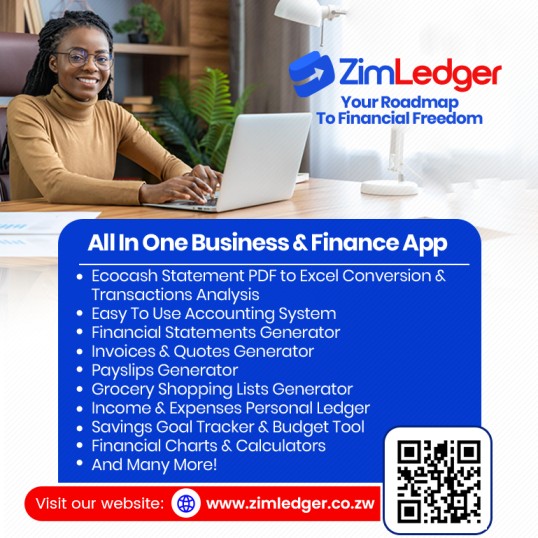Why Your Future Depends on What You Learn Outside the Classroom
Dear George,
You are in your final year at university, polishing your CV and preparing for graduation. You have big expectations about walking into a well-paying job after receiving your qualification. You believe that your education guarantees you a place in Zimbabwe’s formal economy.
George, I need to share some uncomfortable truths with you—truths that your university will not tell you because acknowledging the employment crisis would damage their enrollment numbers and reputation.
The Employment Reality Check
Zimbabwe’s unemployment rate tells a story your lecturers prefer to avoid: formal jobs are scarce, competition is fierce, and even excellent qualifications do not guarantee employment. Thousands of graduates compete for dozens of positions. Many qualified people remain unemployed for years, not because they lack ability, but because opportunities simply do not exist in sufficient numbers.
You should absolutely apply for jobs and pursue every formal employment opportunity available. But you must also accept that getting a job is completely beyond your control. Employers make decisions based on factors you cannot influence: their budget constraints, their hiring preferences, their internal politics, their personal connections.
The University Skills Gap Nobody Discusses
Universities in Zimbabwe continue teaching as if we still have a thriving formal economy that absorbs graduates into stable corporate careers. But our economy has transformed into something completely different—an informal economy where survival and success depend on practical skills, entrepreneurial thinking, and the ability to create your own opportunities.
The skills universities provide—theoretical knowledge, essay writing, exam preparation—have value, but they are not aligned with the economic reality most graduates will face. Your education prepared you for jobs that might not exist rather than for the economy that actually does exist.
Your Skills Development Strategy
I want to share which skills you should learn that will empower you to create your own income, build your own business, and become your own boss regardless of what happens with formal employment opportunities.
The Practical Skills That Generate Immediate Income
Zimbabwe’s informal economy rewards people who can solve practical problems with their hands. These skills are in constant demand and can generate income almost immediately:
Construction and Building Skills:
– Carpentry – furniture making, home repairs, custom woodwork
– Welding – gate/window panes/curtain rods manufacturing, metalwork, fabrication services
– Plumbing – installations, repairs, maintenance services
– Aluminium fitting – windows, doors, roofing services
– Tile fitting – bathrooms, kitchens, floor installations
– Painting – residential and commercial painting services
– General construction – building, renovations, maintenance work
Personal Care and Lifestyle Services:
– Barbering – always in demand, minimal startup costs
– Hairdressing – especially for women’s styling and treatments
– Makeup artistry – weddings, events, photography sessions
– Sewing and tailoring – uniforms, worksuits, curtains, custom designs, clothing alterations
Food and Production:
– Baking – cakes, bread, pastries for events and retail
– Catering – small events, office lunches, party services
– Soap making – household and commercial soap production
Technical and Repair Services:
– Mechanics – vehicle repairs, maintenance, diagnostics
– Phone and laptop repair – increasingly valuable as devices become essential
– CCTV installation – security systems for homes and businesses
– Solar panel installation – growing demand for renewable energy solutions
Property and Maintenance:
– Pool maintenance and cleaning – ongoing service for residential and commercial properties
Agriculture and Production:
– Farming – crop production, livestock, market gardening
How to Learn These Skills Without Going Back to School
University taught you to learn through lectures and textbooks, but practical skills are learned through hands-on experience:
Find a builder and offer to work for free while learning. Experienced builders need helpers, and you need skills. Offer your time in exchange for training.
Visit High Glen furniture industry where hundreds of small entrepreneurs operate workshops. Approach them honestly: “I want to learn carpentry. Can I work with you for free while I learn the basics?”
Take short courses for skills like sewing, baking, or makeup artistry. One month of focused training can give you enough knowledge to start practicing professionally.
Work for free initially to build your skills and reputation. Once you demonstrate competence, you can start charging for your services.
Learn from multiple sources. Work with different professionals to understand various approaches and techniques.
The Digital Skills Revolution
The internet has created entirely new categories of work that universities barely acknowledge:
Web Design and App Development: Zimbabwean businesses desperately need websites and apps, but most cannot afford expensive agencies. Learn to create basic websites & apps and you will have more work than you can handle.
Graphic Design: Every business needs flyers, business cards, social media graphics, and promotional materials. Learn design software and start offering these services locally.
Photography: Events, portraits, product photography, real estate photography—visual content is always in demand.
Video Editing: With everyone creating content for social media, video editing skills can generate consistent income from multiple clients.
Social Media Marketing: Help local businesses build their online presence and reach more customers through strategic social media management.
Content Creation: Writing, video production, podcast editing—businesses need content but lack the skills to create it professionally.
The Learning Strategy That Works
Digital skills can be learned entirely online through free and affordable resources:
YouTube tutorials provide comprehensive training in every digital skill imaginable.
Online courses on platforms like Coursera, Udemy, or free alternatives offer structured learning paths.
Practice with real projects by offering free services to local businesses while you develop your skills.
Build a portfolio of your work to demonstrate capabilities to potential clients.
Network with other digital professionals who can provide guidance, collaboration opportunities, and referrals.
The Lifelong Value of Practical Skills
These practical and digital skills offer something your university education cannot: immediate income generation potential and lifelong relevance. Economic conditions change, technology evolves, and industries transform, but people will always need skilled tradespeople and digital professionals.
Unlike theoretical knowledge that might become outdated, practical skills adapt and grow with experience. The carpenter who starts with basic furniture can eventually design custom homes. The graphic designer who begins with simple flyers can develop into a full-service creative agency.
Your Dual-Track Strategy
George, do not abandon your job search, but do not depend on it entirely either. Pursue employment opportunities while simultaneously developing practical skills that can generate income immediately:
Apply for jobs consistently but without desperation or unrealistic expectations about timeline or outcomes.
Dedicate time weekly to learning practical skills that interest you and align with market demand.
Start offering services as soon as you have basic competence, even while continuing to look for formal employment.
Build your reputation through excellent work and customer service in your chosen practical skill area.
Network actively with both formal employers and potential clients for your practical services.
The Independence That Changes Everything
The goal is not to choose between employment and entrepreneurship—it is to develop capabilities that give you options regardless of what the formal economy offers. When you have practical skills that generate income, you negotiate from a position of strength rather than desperation.
Employers respect candidates who have demonstrated ability to create value and solve problems. Customers trust service providers who have proven skills and professional attitudes. Both paths become easier when you have demonstrated competence in practical areas.
Your Skills Development Plan
Starting immediately, commit to building capabilities that will serve you regardless of employment outcomes:
This month: Choose one practical skill that interests you and research learning opportunities in your area.
Next month: Begin learning through free work, apprenticeships, or short courses.
Month 3: Start offering basic services while continuing to develop your skills.
Month 6: Evaluate your progress and consider expanding into related services or additional skills.
Year 1: You should have developed enough competence to generate meaningful income independently while continuing to pursue formal employment.
The Future You Can Control
George, you cannot control whether employers hire you, but you can control whether you develop skills that make you valuable in Zimbabwe’s actual economy. You cannot control economic conditions, but you can control your ability to adapt and thrive regardless of those conditions.
Your education provided important foundational knowledge, but your practical skills will provide food on your table and money in your pocket. Both have value, but only practical skills guarantee your ability to generate income independently.
Take control of your economic future by developing capabilities that work in the economy we have, not just in the economy we wish we had.
Your success will depend more on what you learn in workshops and on job sites than on what you learned in lecture halls. Start learning today.
With respect for your future success,
ZimLedger Admin
ZimLedger
ZimLedger is the all in one business and finance platform for Zimbabwe. It generates quotes, invoices, payslips and financial statements, manages business ledgers, tracks income and expenses, and builds shopping lists. ZimLedger offers a simple yet powerful solution tailored to local needs. Whether you are budgeting in ZiG or USD, managing business accounts, converting Ecocash statements, or tracking household expenses, ZimLedger empowers you to stay organised, make informed financial decisions, and grow your wealth—right from your phone or computer.













